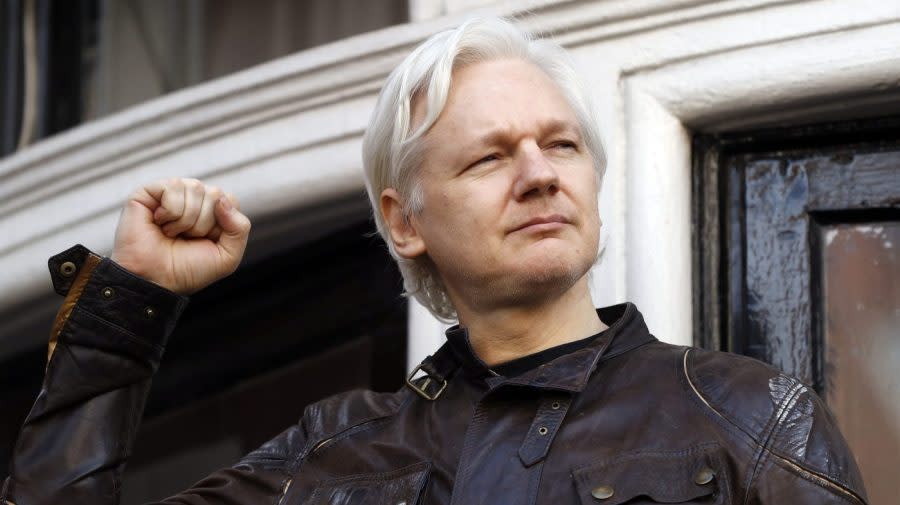Australian delegation visits DC to push for Assange’s release

- Oops!Something went wrong.Please try again later.
An Australian delegation visited Washington, D.C. this week to push the U.S. Department of Justice (DOJ) to cease its attempts to extradite and imprison WikiLeaks publisher and Australian national Julian Assange.
The group of lawmakers, from across the Labor, Liberal, Greens and National parties, lobbied U.S. officials on Wednesday to abandon their attempt to extradite Assange from a British prison to the U.S., where he could face a 175-year sentence.
Australian House of Representatives member Tony Zappia told reporters during the press conference Wednesday in front of the DOJ that he and his colleagues had “useful meetings” with U.S. officials.
“Throughout the day, we’ve had several meetings and we’re not going to go into the details of those meetings, But I can say that they’ve all been useful meetings, Zappia said. “They’ve enabled us as representatives of both the parliament and the Australian people to make and put our case very clearly about the fact that the Julian Assange pursuit and detention and charges should be dropped and should come to an end.”
The WikiLeaks publisher faces 17 Espionage Act charges and one charge of computer misuse, if extradited to the U.S., due to the site’s publication of diplomatic cables and classified military documents.
These editorial decisions are used by U.S. prosecutors as a pretense to go after Assange, arguing that by publishing the material, sources and allies are put at risk.
Australian Greens Senator David Shoebridge dismissed the charges, saying that Assange has been charged with “the crime of being a journalist.”
“The only crime that we see Julian Assange has been charged with is a crime of being a journalist, a crime of telling the truth,” Shoebridge said. “And the fact that it’s an Australian citizen that has been targeted by one of our closest friends and allies, is a very real concern to us as politicians and to a growing part of the Australian public.”
Liberal Parties Senator for South Australia Alex Antic praised the united effort of his colleagues, and told reporters that they want to see Assange “as soon as possible.”
“We may not agree on almost anything else in politics other than this one issue, and it is an enormous effort,” Antic said. “We’ve seen 67 members of the Australian Parliament share that message in a joint letter, which we’ve delivered across the spectrum, as well today.”
“I don’t think that’s ever happened before. I think we’re seeing an incredible groundswell and we want to see Julian [Assange] at home as soon as possible.”
A dozen of Assange’s defenders attended the press conference. They were holding signs and wearing shirts in support of the WikiLeaks founder’s freedom.
After the conference, Assange’s brother Gabriel Shipton addressed the media.
Shipton said that the matter of Assange’s charges has created “a wedge in the Australian-U.S. relationship.”
“It’s now a wedge in the Australian-US relationship, which is a very important relationship at the moment, particularly with everything that’s going on with the U.S. and China and the sort of strategic pivot that is happening,” Shipton said. “So I think it is something that the State Department would very much like to resolve in that sense, and have it cleared off their plate.”
Shipton also mentioned that Assange is having a tough time with the extradition proceedings in the U.K., but family keeps him going.
“It’s tough times for him at the moment,” Shipton said. “The extradition proceedings in the UK are coming to a head and so it’s at these times that are most difficult for Julian. But he has his family, we visit him and telephone call, which keep him going.”
Assange has now been detained in London’s Belmars prison since 2019 — the year he was evicted from the Ecuadorian embassy. He spent seven years in the embassy to avoid extradition to Sweden.
In late 2011, the High Court in London said that the Australian should be extradited to Sweden. This came after two former WikiLeaks volunteers accused the publisher of sex crimes.
Assange appealed. After the appeal failed, he went to Ecuador’s embassy in London, where he stayed, claiming political asylum. Sweden dropped the investigation against him in 2017, but he remained in the embassy due to fear of being prosecuted by the U.S.
For the latest news, weather, sports, and streaming video, head to The Hill.

